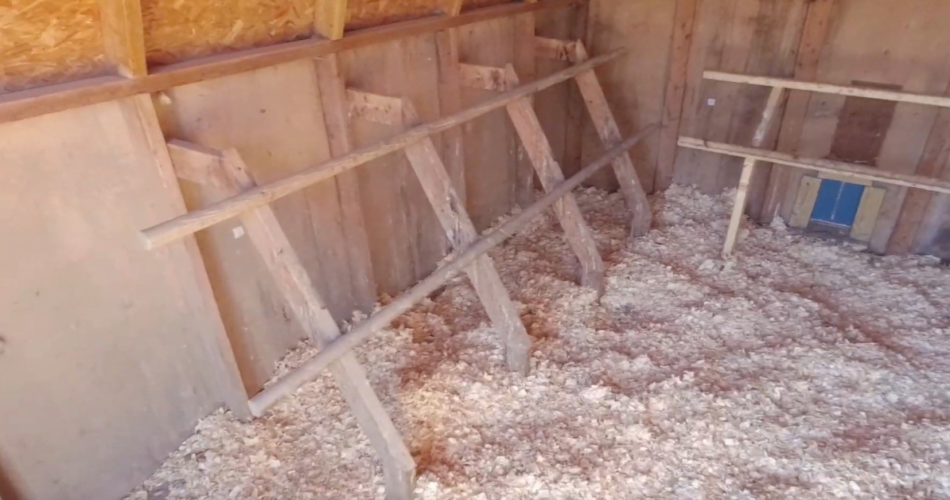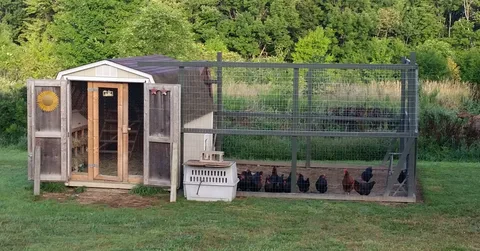Understanding the Importance of Litter in Urban Chicken Coops
Maintaining Cleanliness
- Proper litter management helps keep the chicken coop clean by absorbing moisture, droppings, and odors.
- Cleanliness is essential for preventing the buildup of harmful bacteria and parasites that can affect the health of your chickens and increase the risk of disease transmission.

Odor Control
Litter materials such as straw, wood shavings, or shredded paper help control odors by absorbing ammonia and other odorous compounds.
Effective odor control is crucial for maintaining neighbor relations in urban areas and ensuring a pleasant environment for both chickens and humans.
Waste Management
Using litter in the chicken coop facilitates waste management by providing a designated area for droppings and other organic matter.
Properly managed litter can be composted and recycled, reducing environmental impact and providing nutrient-rich fertilizer for urban gardens.
Selecting the Right Litter Materials
Straw
- Straw is a popular and affordable litter option that provides excellent absorbency and odor control.
- Choose wheat straw or oat straw, free from mold and dust, to ensure the health and safety of your chickens.
Wood Shavings
- Wood shavings, such as pine or cedar, are another common choice for chicken coop litter.
- Avoid using cedar shavings, as they contain aromatic compounds that can irritate the respiratory system of chickens.
Shredded Paper
Shredded paper is a cost-effective and eco-friendly litter option, especially for urban chicken keepers looking to recycle household waste.
Use plain, unprinted paper and avoid glossy or colored paper, which may contain harmful chemicals.
Applying and Maintaining Litter in the Chicken Coop
Application
- Spread a layer of litter material, approximately 2-3 inches thick, evenly across the floor of the chicken coop.
- Monitor moisture levels and add additional litter as needed to maintain cleanliness and absorbency.
Cleaning
- Perform regular spot cleaning to remove soiled litter and droppings from the coop, especially in high-traffic areas.
- Replace soiled litter with fresh material to prevent odor buildup and maintain a clean environment for your chickens.
Composting
- Used chicken coop litter can be composted to create nutrient-rich organic fertilizer for your urban garden.
- Combine litter with other compostable materials such as kitchen scraps, yard waste, and garden trimmings, and maintain proper composting conditions to facilitate decomposition.
Tips for Success in Urban Chicken Keeping
Proper Ventilation
- Ensure adequate ventilation in the chicken coop to prevent moisture buildup and promote airflow, reducing the risk of respiratory issues in chickens.
Pest Control
- Implement pest control measures to prevent infestations of flies, rodents, and other pests attracted to chicken coop litter.
- Use natural remedies such as diatomaceous earth or beneficial nematodes to control pests without harming chickens or the environment.
Regular Monitoring
- Monitor litter moisture levels, odor, and cleanliness regularly to identify and address any issues promptly.
- Keep a close eye on the health and behavior of your chickens, as changes may indicate underlying problems related to litter management or other factors.
What is the purpose of using litter in a chicken coop?
Using litter in a chicken coop serves multiple purposes, including maintaining cleanliness, controlling odors, and facilitating waste management by providing a designated area for droppings and other organic matter.
What types of litter materials are suitable for urban chicken coops?
Suitable litter materials for urban chicken coops include straw, wood shavings, shredded paper, and other absorbent materials that promote cleanliness and odor control without posing health risks to chickens or humans.
How do I select the right litter material for my chicken coop?
When selecting litter material, consider factors such as absorbency, odor control, availability, and cost. Choose materials that are safe, non-toxic, and easy to manage in an urban environment.
How often should I clean and replace the litter in my chicken coop?
The frequency of cleaning and replacing litter in the chicken coop depends on factors such as the number of chickens, coop size, and litter type. Generally, spot clean the coop daily and replace soiled litter as needed to maintain cleanliness and odor control.
Can I compost used chicken coop litter?
Yes, used chicken coop litter can be composted to create nutrient-rich organic fertilizer for urban gardens. Combine litter with other compostable materials and maintain proper composting conditions to facilitate decomposition and minimize odor.
How do I prevent pests attracted to chicken coop litter?
Implement pest control measures such as proper coop maintenance, sealing entry points, and using natural remedies like diatomaceous earth or beneficial nematodes to deter flies, rodents, and other pests attracted to chicken coop litter.
Is it safe to use litter made from cedar or pine wood shavings?
While pine wood shavings are generally safe for use in chicken coops, cedar shavings should be avoided, as they contain aromatic compounds that can irritate the respiratory system of chickens and humans.
Do I need to add bedding material under the litter in my chicken coop?
Adding bedding material such as straw or hay under the litter in the chicken coop can provide additional cushioning, insulation, and absorbency. However, it is not strictly necessary and depends on personal preference and management practices.
Can I use litter from my chicken coop as mulch in my garden?
Yes, chicken coop litter can be used as mulch in the garden to suppress weeds, retain moisture, and improve soil fertility. However, ensure that the litter is fully composted before applying it to garden beds to prevent burning plants or introducing pathogens.
Are there any health risks associated with using litter in a chicken coop?
When used properly, litter in a chicken coop poses minimal health risks to chickens and humans. However, improper management, such as overaccumulation of waste or exposure to toxic materials, can lead to respiratory issues, parasite infestations, or other health problems. Regular monitoring and maintenance are essential for minimizing health risks associated with using litter in a chicken coop.
- Explore THC Infused Drinks in New York - May 9, 2025
- The Latest in THC Seltzers Across Texas - May 9, 2025
- Top THC Infused Drinks Available in Oklahoma - May 9, 2025





